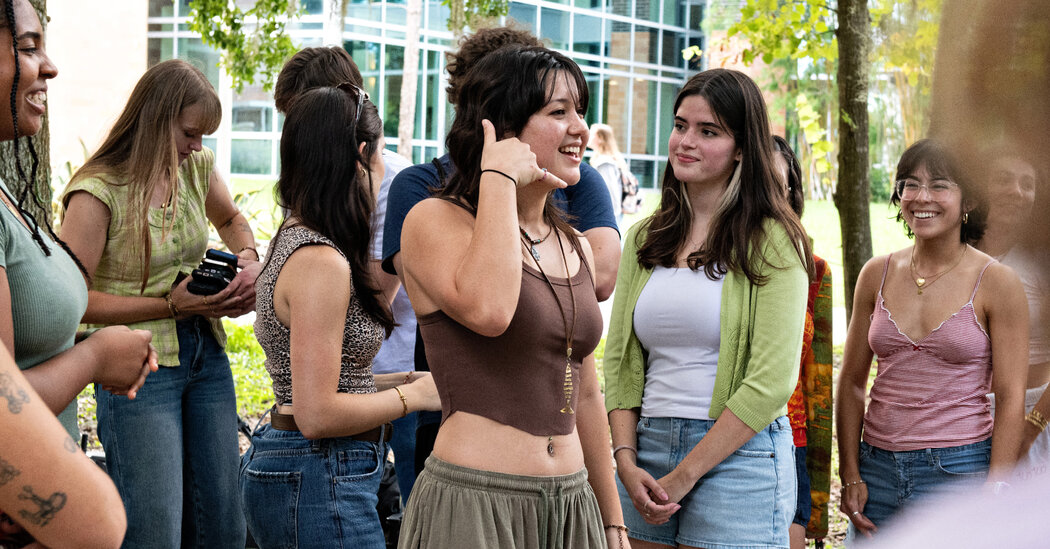
Nearly every student clutches a phone in one hand as they traverse the University of Central Florida campus, even while walking in groups. Laptops and tablets are lunchtime companions, and earbuds and headphones are routine accessories. While waiting for class to start, many students sit in silence, drawn into their devices.
It is a familiar and exasperating scene for Seán Killingsworth, 22, a former U.C.F. student. “What is this life I’m signing up for?” he asked himself during his sophomore year. “It was just like, I’m talking to a bunch of zombies.”
Mr. Killingsworth craved a space where he could chat with his peers without feeling as though he was intruding. When he was in high school, he ran into similar conundrums, so he would organize phone-free hangouts with friends.
Why not in college too?
In 2023, he helped bring the idea of no-phone social time to two different Florida campuses — U.C.F. and Rollins College. He called it the Reconnect Movement: During meetings, everyone was required to hand over their phone and socialize without devices, a concept that has become a big draw for like-minded students. Reconnect has now spread to six schools in four states. And in September it broadened its reach beyond students, hosting a phone-free event in New York — soon to be followed by Orlando and Tampa — that anyone could attend.
Reconnect’s popularity dovetails with a cultural shift in how smartphones and social media are perceived by adults and adolescents alike.
Experts have sounded the alarm about the potential mental health dangers of digital media, even though it’s hard to prove a causal connection between this technology and the rising rates of loneliness, anxiety and depression in young people. Campaigns to reduce or delay smartphone use like “Wait Until 8th” and books like Jonathan Haidt’s best-selling “The Anxious Generation” have struck a deep chord, particularly with parents. Meanwhile, new laws are popping up countrywide to ban phones at public schools.
Student-led movements have often encouraged phone abstinence, but Mr. Killingsworth’s Reconnect Movement doesn’t push students to change their relationship with technology. Instead, it aims to create what he called “human connection habitats” that eliminate the need for willpower.
Building a ‘human connection habitat’
On a recent sticky afternoon nearly 40 students gathered at the U.C.F. campus arboretum for the first Reconnect meeting of the fall semester. After surrendering their devices to a “phone valet,” they sat cross-legged on patchwork blankets and prepared to spend one hour without screens.
As a CD player belted out reggae music from the band Stick Figure, many of the students began to make eye contact and small talk. You would be forgiven for thinking you had been transported back 20 years.
Students can feel uncomfortable at the start of a meeting, said Mia Shaffner, 20, the U.C.F. club president. Phones act as a “digital pacifier,” she said, and her peers tend to scroll when they feel uneasy. But by the end, she added, they get to know each other and realize that talking is “not really as difficult as they think it is.”
To start, she asked the group to introduce themselves, and share one high point from the week along with a low point. Taylor Radtke, 20, the club’s social media coordinator who had made brown butter M&M cookies for the event, shared her high: getting a tattoo of a striped cat wearing boots and a cowboy hat, wielding a large lasso — inspired by her two cats back home in Wisconsin, Bandit and Lucky.
Later, when the group began to chat one on one, it would serve as a conversation starter.
“It led me to share about my other tattoos, their meanings, and from there we got to talking about each other’s interests and their own pets,” Ms. Radtke said. “You never know what you might have in common.”
Isabella Ortiz, 18, a freshman biotechnology major, joined Reconnect to meet new friends. She recalled a futile attempt to communicate with another student on campus recently. “I like your hair,” she had said at the time. But the other student, who was wearing headphones, didn’t hear her.
Ms. Ortiz says she feels as though everyone at school — herself included — is chronically online. She has tried deleting social media platforms before, but, she admitted, “it hasn’t been very successful.”
At one point Mr. Killingsworth was compulsively looking at his phone: “It would be a constant 24-7 feeling that I need to be on: I’m feeling a notification. That’s an email. I need to respond to that at some point.”
And social media comparisons left him feeling defeated: “Snapchat made me more self-conscious about my appearance than I’d ever been before,” he said. Instagram, where he would watch clips of fellow skateboarders doing crazy tricks in amazing skate parks, made him feel like he didn’t measure up.
So he deleted social media and has since switched to a flip phone, he said, after deciding that the smartphone prevented him from living his life “in a happy way.” During a speech last fall in Weyers Cave, Va., hosted by The Campus Suicide Prevention Center of Virginia, Mr. Killingsworth warned that phones “weaken and destroy” social ecosystems and called Gen Z’s social environment a “wasteland.”
But scholars like the psychologist Candice L. Odgers have questioned whether digital media is the boogeyman that it is often made out to be. She argues that more frequent social media use may reflect underlying symptoms of depression or anxiety. In her view, there isn’t sufficient evidence to suggest that using social media a lot would prompt those mental health issues. Dr. Odgers and others have also noted that social media platforms provide people with a unique means of self-expression and connection.
When asked for their opinion on the matter, teenagers report that they enjoy taking breaks from their devices. A 2023 study from the Pew Research Center found that about three-quarters of teens felt happy or peaceful when they didn’t have their smartphone. Even so, more than 40 percent admitted that when they didn’t have their phones, it sometimes made them feel anxious, upset and lonely.



